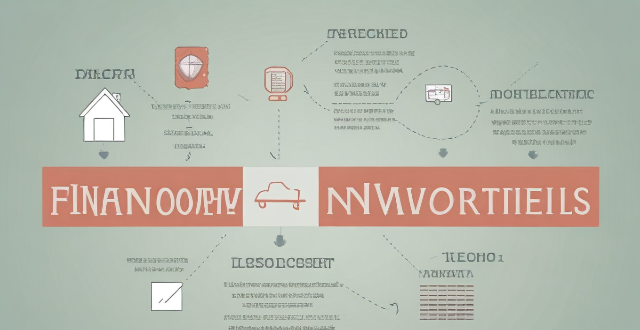Investment Potential

Are there any low-risk investment options that still offer wealth growth potential ?
Investing always comes with a certain level of risk, but there are some investment options that are considered to be relatively low-risk while still offering the potential for wealth growth. These include savings accounts and certificates of deposit (CDs), bonds, mutual funds and exchange-traded funds (ETFs), and real estate investment trusts (REITs). It's important to do your research and understand the risks involved before making any investment decisions.

How do private equity firms identify potential investment opportunities ?
Private equity firms use various methods to identify potential investment opportunities, including networking and relationship building, direct outreach, industry analysis, competitive intelligence, financial analysis, deal sourcing platforms, strategic partnerships, tracking M&A activity, and event-driven opportunities. These methods involve a mix of qualitative assessments and quantitative analysis to ensure a comprehensive approach to identifying viable targets for private equity investment.

How does clean energy investment compare to traditional energy investment ?
Investing in energy sources is crucial for the development and growth of any economy. However, the choice between clean energy investment and traditional energy investment has become a significant topic of discussion in recent years. This comparison will explore the differences between these two types of investments, focusing on their costs, benefits, and potential impacts on the environment and society.

How does gold investment work ?
Gold investment is a popular way to diversify your portfolio and hedge against inflation, offering various forms such as physical gold, ETFs, mutual funds, mining company stocks, futures, and options. It provides benefits like hedging against inflation, portfolio diversification, and acting as a safe haven during crises but also involves risks including price volatility and storage costs. To start investing in gold, one should educate themselves, determine their investment goals, choose the right type of investment, allocate a budget, research vendors/brokers, and monitor their investment.

How does gold investment compare to other types of investments ?
This article compares gold investment with other types of investments, such as stocks, bonds, real estate, commodities (other than gold), and cryptocurrencies. It highlights the advantages and disadvantages of each type of investment, emphasizing that the choice of where to invest depends on individual goals, risk tolerance, and market conditions. The article also suggests conducting thorough research and seeking professional advice before making any investment decisions.

What are some good retirement investment options ?
The text discusses various retirement investment options including 401(k) plans, individual retirement accounts (IRAs), mutual funds, exchange-traded funds (ETFs), and real estate investment trusts (REITs). It explains the benefits and limitations of each option.

How do I choose a sustainable investment fund ?
Choosing a sustainable investment fund requires careful consideration of various factors, including your investment goals, the fund's ESG criteria and performance history, the experience of the fund manager, the fund's holdings and alignment with your values, fees and expenses, and ongoing monitoring of your investment. By following these steps, you can select a sustainable fund that aligns with your financial goals and personal values.

What are the tax implications of receiving venture capital investment ?
Receiving venture capital investment can have significant tax implications for a startup company, including the treatment of investment proceeds as ordinary income and potential valuation issues. Tax credits and incentives may be available, and exit strategies should be evaluated for their tax consequences. Additional accounting and reporting requirements may also arise. It is important to work with a qualified tax professional to ensure compliance with tax laws and maximize the benefits of venture capital investment.

Which financial product offers the highest return on investment ?
Investing in financial products is a popular way to grow wealth, but with many options, it's hard to determine which offers the highest return on investment (ROI). This article explores popular financial products and their potential returns. The stock market offers high potential returns but also significant risks. Real estate can provide rental income and property appreciation, but comes with its own set of risks. Mutual funds offer professional management and diversification, but fees and expenses can impact returns. Cryptocurrencies have gained popularity as an alternative investment option, but are highly volatile and speculative, making them unsuitable for most investors seeking stable returns. Determining which financial product offers the highest return on investment depends on various factors, including risk tolerance, investment goals, and market conditions. Diversification across different asset classes and investment vehicles can help minimize risks and maximize returns over time.

What are the potential returns on investment for clean energy projects ?
Investing in clean energy projects offers potential financial, environmental, and social returns. Factors such as capital appreciation, dividends, tax credits, carbon emission reductions, air quality improvements, job creation, and energy security contribute to the overall benefits of these investments. As the global transition towards a low-carbon economy progresses, investing in clean energy projects presents a wise and sustainable option for investors seeking both positive impact and financial gains.

How do you identify potential investment opportunities through stock market analysis ?
The article outlines a step-by-step guide to identifying potential investment opportunities through stock market analysis. It begins with understanding the basics of the stock market and choosing between fundamental and technical analysis methods. The next step is conducting research on individual companies, including creating a watchlist, analyzing financial statements, evaluating management teams, and assessing industry trends. Technical analysis tools such as moving averages and RSI are then used to analyze price trends and patterns. Finally, setting up alerts and tracking performance helps in adjusting the portfolio based on new information or changing market conditions.

How can improving financial knowledge contribute to better investment decisions ?
Improving financial knowledge is crucial for better investment decisions. It increases understanding of options, improves risk management, boosts analytical skills, fosters a long-term perspective, and increases confidence in choices.

Is cryptocurrency a good investment for beginners ?
Cryptocurrency can be a good investment for beginners, but it is important to understand the risks and complexities involved before making any investment decisions. Advantages of investing in cryptocurrency include high returns, decentralization, and anonymity. Disadvantages include volatility, lack of regulation, complexity, and security risks. Tips for beginners investing in cryptocurrency include educating yourself, starting small, diversifying your portfolio, staying up-to-date, seeking professional advice, using reliable exchanges, keeping your private keys safe, monitoring your investments, being prepared for volatility, and having patience.

How do I determine the appropriate level of risk for my investment strategy ?
Investing is a crucial step towards achieving financial goals, but it's essential to determine the appropriate level of risk that aligns with your investment strategy and objectives. The first step is understanding your risk tolerance by assessing your comfort level with potential losses and volatility. Your investment objectives play a crucial role in determining your risk tolerance. Once you have a clear understanding of your risk tolerance and investment objectives, evaluate different investment options such as stocks, bonds, mutual funds, ETFs, and real estate. Finally, monitor your portfolio regularly and make adjustments as needed to maintain your desired asset allocation and manage risks effectively.

What is the future outlook for gold investment ?
The future outlook for gold investment is influenced by various factors such as economic conditions, monetary policy, supply and demand dynamics, and investor sentiment. Economic uncertainty can drive up the demand for gold as a safe-haven asset, while periods of growth may decrease its value. Central banks' interest rate decisions and money supply changes can also impact gold prices. Supply and demand dynamics, including mining production and jewelry demand, play a role in determining gold availability and price. Finally, investor sentiment towards gold can be shaped by market trends, investment strategies, and overall risk appetite. By monitoring these key factors, investors can make informed decisions about the viability of gold as a portfolio addition in the coming years.

What are the best financial products for long-term investment ?
The text provides a comprehensive overview of the various financial products available for long-term investment. It explains the definition, benefits, and risks of each option including stocks, bonds, mutual funds, ETFs, and REITs. The text emphasizes the importance of considering one's investment goals, risk tolerance, and financial situation before choosing which products to include in a portfolio. Overall, the text serves as a useful guide for individuals looking to make informed decisions about their long-term investments.

How do I know if gold investment is right for me ?
Investing in gold can be a great way to diversify your portfolio and protect yourself from market volatility. However, it's important to consider whether this type of investment is right for you. Here are some factors to consider: Risk Tolerance: Gold is generally considered a safe haven asset, meaning that it tends to hold its value during times of economic uncertainty. However, like any investment, there is always some degree of risk involved. You should only invest in gold if you are comfortable with the potential risks and volatility of the market. Investment Goals: Are you looking to grow your wealth over time, or are you more interested in preserving your current assets? Gold has historically been a good store of value, but it may not provide the same growth potential as other investments. Consider your long-term goals and whether gold aligns with them. Market Conditions: The performance of gold can vary depending on market conditions. For example, during times of inflation or economic turmoil, gold may perform well as investors seek out safe haven assets. Keep an eye on market trends and conditions before making any decisions about investing in gold. Costs and Fees: Investing in gold can come with various costs and fees, including storage fees, insurance costs, and transaction fees. Make sure you understand all of these costs before investing. Additionally, consider the impact of taxes on your gold investments. Liquidity: While gold is generally considered a liquid asset (meaning it can be easily bought and sold), there may be times when it is difficult to find buyers or sellers at desirable prices. This could affect your ability to access your funds quickly if needed. Consider how much liquidity you need in your portfolio before investing in gold.

How do I choose the right broker for my investment strategy ?
Choosing the right broker is crucial for investment success. Understand your goals, risk tolerance, and horizon. Consider full-service, discount, or online brokers based on fees, services, and platform usability. Evaluate fees, customer service, regulation, security, and investment options. Follow a step-by-step process to choose the best broker for your needs.

What are some best practices for integrating climate risk into investment decision-making processes ?
As climate change continues to affect financial markets, integrAs climate change continues to affect financial markets, integr decision-making processes is becoming integrating climate risk into investment decision-making processes is becoming increasingly important. Best practices for doing so include assessing climate risk in the investment process, incorporating climate risk into investment analysis, monitoring and reporting on climate risk exposure, and collaborating with other stakeholders. These practices help investors manage climate risk effectively and make informed investment decisions that align with sustainability goals.

How does clean energy investment impact the environment ?
Clean energy investment positively affects the environment in various ways, including reducing greenhouse gas emissions, conserving natural resources, improving air quality, promoting sustainable practices, and enhancing long-term energy security. These efforts help mitigate climate change, protect ecosystems, reduce pollutants, encourage innovation and job creation, and stabilize energy prices. As environmental challenges persist, prioritizing clean energy investment is crucial for the planet's health and future generations.

What is the role of asset allocation in an investment strategy ?
Asset allocation is a crucial component of any investment strategy, involving dividing your portfolio among different asset classes based on your financial goals, risk tolerance, and investment horizon. It plays a vital role in determining the overall performance of your portfolio by helping you manage risk and maximize returns through diversification. To determine your asset allocation, consider your financial goals, risk tolerance, investment horizon, and consult with a financial advisor. Review and adjust your asset allocation regularly as your circumstances change and new opportunities arise.

What is the impact of market volatility on my investment strategy ?
Market volatility can significantly impact your investment strategy by affecting risk tolerance, portfolio allocation, timing of investments, emotional responses, and both long-term and short-term goals. It's crucial to anticipate and account for market fluctuations in your approach. Diversification, rebalancing, and strategies like dollar-cost averaging can help mitigate risks and smooth out the effects of volatility over time. Emotional discipline is also essential, as fear and greed can lead to suboptimal decisions. Opportunities may arise during volatile periods, but it's important not to overreact to short-term events and maintain a focus on long-term fundamentals. A well-diversified portfolio and a long-term perspective are key tools for navigating market volatility successfully.

What are the key factors to consider when looking for venture capital investment ?
When seeking venture capital investment, entrepreneurs should consider factors such as a strong business plan, traction and growth potential, an experienced management team, competitive advantage, and financial health. A well-crafted business plan should include market analysis, financial projections, and an exit strategy. Traction can be demonstrated through customer acquisition, revenue growth, or product development milestones. An experienced management team with relevant expertise in the industry is also crucial. Competitive advantage can be showcased through a unique selling proposition, intellectual property, or market differentiation. Finally, maintaining financial health and clearly defining funding needs are essential for securing venture capital investment. By considering these key factors, entrepreneurs can increase their chances of success in fundraising efforts and overall business growth.

What is the role of financial advisors in developing an investment strategy ?
Financial advisors are pivotal in shaping investment strategies by identifying financial goals, assessing risk tolerance, analyzing market conditions, designing portfolio allocation, monitoring and adjusting investments, and providing ongoing advice. They help individuals and businesses achieve their short-term objectives like building an emergency fund and reducing debt, as well as long-term goals such as retirement planning and education funding. By evaluating risk appetite, they tailor investment plans that prioritize capital preservation or pursue growth potential through diversification. Understanding macroeconomic factors and industry trends further informs investment decisions. In portfolio design, they allocate assets across classes and employ diversification to mitigate risks. Through performance tracking and rebalancing, they ensure investments remain aligned with goals. Moreover, financial advisors offer educational and emotional support, enhancing client knowledge and helping them manage risks. Overall, they ensure strategies reflect clients' evolving needs, fostering informed and balanced investment approaches.

What are some effective investment strategies for retirement planning ?
Retirement planning is a crucial aspect of financial planning, and it requires careful consideration of various investment strategies. Diversification helps reduce overall risk by spreading investments across different asset classes. Long-term investing takes advantage of compounding interest and allows for market fluctuations to even out over time. Dollar-cost averaging minimizes the impact of market volatility by investing a fixed amount regularly. Target-date funds offer a hands-off approach with automatic adjustments based on age and time horizon. Tax-advantaged accounts provide tax benefits that can help maximize retirement savings. By using these effective investment strategies, you can build a solid foundation for your retirement planning while minimizing risks and maximizing returns.

What are the potential risks and rewards of investing in cryptocurrency ?
Investing in cryptocurrency can be a lucrative venture, but it also comes with its own set of potential risks and rewards. In this article, we will explore the various factors that investors should consider before diving into the world of cryptocurrencies. One of the biggest potential rewards of investing in cryptocurrency is the possibility of high returns. Many investors have seen significant gains from their investments in cryptocurrencies, particularly during times when the market is experiencing rapid growth. Another potential reward of investing in cryptocurrency is the decentralized nature of the technology. Unlike traditional financial systems, which are controlled by central authorities, cryptocurrencies operate on a decentralized network that allows for greater transparency and security. Finally, investing in cryptocurrency can also provide investors with access to innovative new technologies and ideas. As the industry continues to evolve, there will be many opportunities for investors to get involved in new projects and technologies that have the potential to revolutionize the way we think about money and finance. Despite these potential rewards, there are also many potential risks associated with investing in cryptocurrency. One of the biggest risks associated with investing in cryptocurrency is its volatility. The value of cryptocurrencies can fluctuate rapidly and unpredictably, making it difficult to predict future prices. This means that investors could potentially lose a significant portion of their investment if they are not careful. Another risk associated with investing in cryptocurrency is security risks. Since cryptocurrencies are stored in digital wallets, they are vulnerable to hacking and other forms of cybercrime. If an investor's wallet is compromised, they could lose all of their funds. Finally, there is also a risk associated with regulatory changes. Governments around the world are still figuring out how to regulate cryptocurrencies, and new regulations could potentially impact the value of certain coins. This means that investors need to stay up-to-date on any regulatory changes that may affect their investments. In conclusion, while there are certainly risks associated with investing in cryptocurrency, there are also many potential rewards for those who are willing to take a chance. By carefully considering these factors and doing your research before investing, you can make informed decisions about whether or not cryptocurrency is right for you.

What is the average return on investment for private equity ?
Private equity (PE) investments can offer attractive returns, but these are influenced by several factors. The success of the companies in which PE firms invest, market conditions, investment strategy, and timing all play a role. Historically, PE has delivered average annualized returns of 12-15%, though these can be volatile. It's important for investors to understand the J-curve effect, fees, and the benefits of diversification when considering PE investments.

What are some potential solutions to combat climate change ?
Potential Solutions to Combat Climate Change

What are the potential risks and challenges associated with implementing CSR initiatives ?
Implementing Corporate Social Responsibility (CSR) initiatives can bring benefits to a company, but also comes with potential risks and challenges. These include lack of clear goals and objectives, limited resources, stakeholder pressure, legal and regulatory issues, difficulty measuring impact, and potential backlash from stakeholders. Companies need to carefully consider these issues before committing to CSR efforts, and should work to mitigate any potential risks through careful planning and execution.

How has private investment impacted the development of space technology ?
Private investment has significantly impacted space technology development by increasing research and development funding, reducing costs, improving efficiency, and driving innovation. Private companies like SpaceX and Blue Origin have made advancements in reusable rockets, satellite communications, and lunar exploration. These investments have also enabled new business models and increased accessibility to space for smaller organizations.